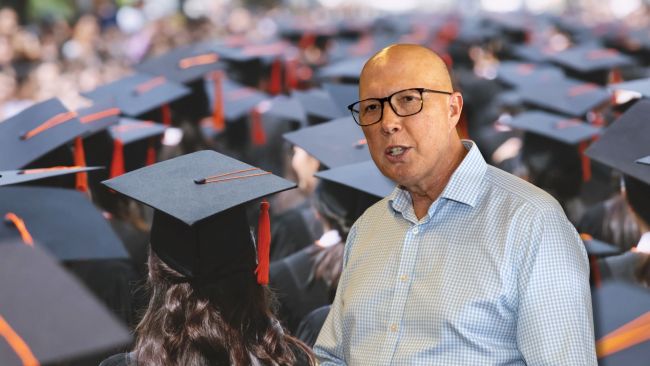ALP sends two NZYQ challenges to High Court
The Albanese government has sought to quash a wave of legal challenges in the wake of the NZYQ ruling by elevating two cases to the High Court.

The Albanese government is seeking to avert another wave of dangerous non-citizens using the landmark NZYQ ruling to be released into the community by elevating the cases of two foreign criminals to the High Court, with a constitutional law expert saying the gamble would backfire if the government’s case failed.
The Attorney-General, Mark Dreyfus, has referred two Federal Court challenges filed by foreign drug offenders arguing that their incarceration in immigration detention is unlawful to the highest court in the land in an aim to prevent more criminal non-citizens walking free.
As the government seeks to contain the impact of the watershed ruling, the nation’s highest court will hear arguments from a Vietnamese drug offender that he should be released from immigration detention despite his case differing from the NZYQ cohort because his visa application is under consideration.
In a move that raises the stakes for the Albanese government following months of political turmoil over migration and constitutional issues, a recently freed Polish drug trafficker’s claim that his incarceration over a period of about 18 months was unlawful will also be considered by the High Court.
The commonwealth intervention comes as Labor faces a tide of wrongful imprisonment claims from non-citizens in the wake of the NZYQ decision, which triggered the release of more than 150 dangerous non-citizens after indefinite detention was found to be unconstitutional. Detainees have also filed damages claims for costs on the grounds their detention was illegal, and requests to lift their visa monitoring conditions.
Constitutional law expert Greg Craven said the government was “rolling the dice” to contain a wave of constitutional challenges, which held significant implications for similar cases if the government lost.
Professor Craven said more detainees could be released if the High Court ruled against the government, as it would extend the scope of the NZYQ decision to include people whose visa applications were pending.
“It basically throws the ball up in the air; there’s always the danger of a precedent being set that makes things even more difficult,” Professor Craven said.
‘This whole thing has been like a legal and constitutional hand grenade, and you throw it in, and you have no idea where the bits are going to go.
“That’s what’s happened, and the government’s trying to get clarity on it, but whenever you go to a court to get an answer, you’re never going to be 100 per cent certain what the answer is going to be.”
A government spokeswoman declined to comment, but Labor sources downplayed the High Court referral as being a typical legal step by a federal government.
Federal Court Chief Justice Debra Mortimer referred the legal question of wrongful imprisonment, or habeas corpus, in both cases for a full bench to decide earlier this month in a judgment that revealed she had convened a panel of nine judges who would consider NZYQ-related cases, with 25 matters before the court.
Mr Dreyfus lodged an application on Tuesday that both cases should instead “be removed into the High Court of Australia”.
Professor Craven said the High Court push could reflect the government’s confidence that it can win the case, or a “hail Mary” legal manoeuvre borne from “desperation from what’s happening in the Federal Court”.
“If they get the wrong ruling from the High Court, their problem is twice as bad, because it really means there’s no nowhere for them to go in terms of judicial proceedings,” he said.
The Vietnamese man at the centre of the case, known as DBD24, was convicted of “drugs offences at a commercial quality” in 2021 and served two years in prison after he was caught loading 14kg of cannabis into his car.
While the NZYQ ruling forced the release of foreign criminals who had their visa applications rejected and were unable to return to the country of origin, DBD24 was in a different category as his visa application was in the process of being assessed.
DBD24’s protection visa was initially rejected by the federal government but the Administrative Appeals Tribunal overturned the decision, finding he could face the death penalty in Vietnam because of his drug conviction.
The AAT also found he could be persecuted for his Catholic faith, failure to complete mandatory military service and anti-government protest activities.
The AAT’s ruling returned DBD24’s application to the federal government, which is yet to make a decision.
High Court documents said his case raised the question of whether the NZYQ ruling applied to non-citizens in detention for the “purpose of considering whether to grant the person a visa” where there is no prospect of their removal from Australia.
The Polish man, CZA19, launched legal action arguing his detention was unlawful and seeking damages, before the Federal Court ruled he should be released into the community in May. CZA19, who was sentenced to a decade in prison, applied for protection on the grounds he would be targeted by the “Grypser” crime gang if returned to Poland.
Australian Lawyers Alliance spokesman Greg Barns said the decision to refer a case to the High Court was motivated by a need to gain “certainty” concerning constitutional questions arising from the NZYQ decision.







To join the conversation, please log in. Don't have an account? Register
Join the conversation, you are commenting as Logout